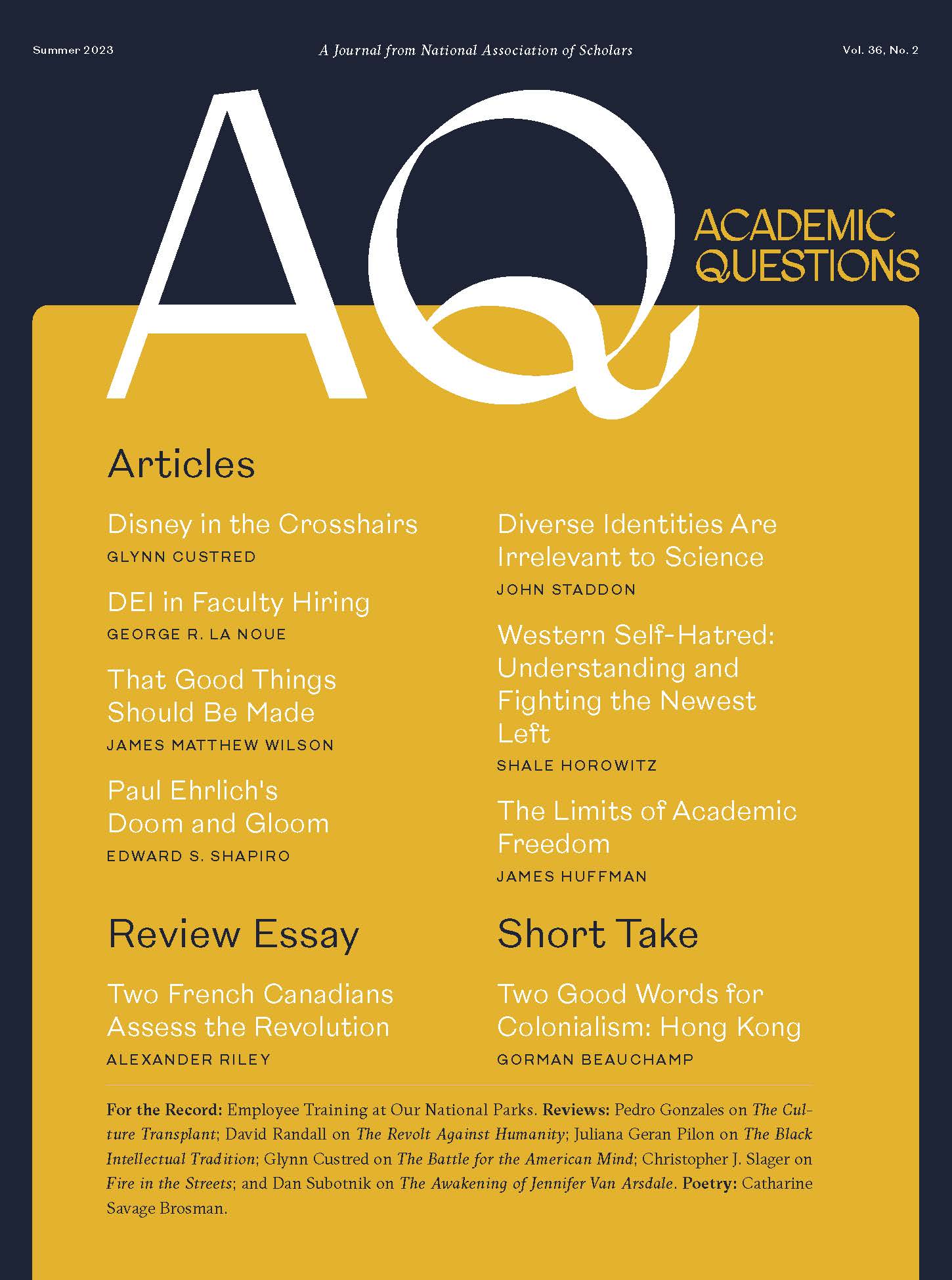To the Editor:
When reading the articles about colonialism in the Winter issue of AQ (P. Eric Louw, “Colonialism: Taking the Good with the Bad”; William L. Howard, “Does the West Hate Itself?”), I thought about a quote from my former professor’s (then mentor, then close friend) book The Age of Imperialism (1969), a very clever collection of primary sources. He was an historian of the British Commonwealth. The quote, I think, provides balance and clarity to the issue of the legacy of colonialism.
From The Age of Imperialism, edited by Robin Winks, pages 2 and 3.
Imperialists were a paradoxical people, for that which was a paradox: bringing immense benefits to millions, equally bringing immense burdens to yet other millions. One cannot speak, now and possibly never (although some historians do so) of a “balance sheet of imperialism,” for this is to imply that Western standards may continue to be the normative ones by which judgment is passed upon an experience of five-hundred years, as though one might award a point system to the colonial power which built good roads, provided for education, sanitation, and peaceful frontiers, and massacred innocent women and children within the locked gates of Amristar. It is patently unfair for the heirs of the imperialists to judge now the fruits of their fathers; it is equally unfair for the “victims” to report their sole patrimony as victimization. Not until the imperial revolution has played out its last century, still with us, can one suggest—and upon standards other than those we can now use—what the fundamental influence of the imperialist has been.
Eugene R. Dattel
Author, Reckoning with Race: America's Failure (2017)
To the Editor:
In the Fall 2022 issue of Academic Questions, Professor Gene Fendt joined Plato in his cave and listened to the gender jabber. (“Cave Speak: The Cacophony About Gender,” Fall 2022).
Fendt uses deductive reasoning, logic, and science to point out that wanting to “bear or engender” a gender identity different from the one assigned by biology has nothing to do with knowledge of reality. It is akin to living in a cave where only shadows of reality are seen. Having crossed through Plato’s fire and stepped into broad daylight, I’m convinced that the current rash of gender dysphoria cases is largely a fashion, not the product of careful medical diagnosis. And “gender affirming care” is off the mark. Persuasive statistics say that 80-90 percent of gender-confused children will grow out of it, and that an instant leap to “affirm” a confused child only adds to that youngster’s pain and mental chaos.
Why the recent torrent of cases? Covid-induced fear and social isolation? Prolonged exposure to social media? (Facebook lists fifty-six genders as kids’ choices.) News media that push “preferred gender-neutral pronouns” such as “it,” “they,” “ze,” or “hir,” and the “coolness” of being gay, lesbian, queer, or nonbinary? Adults who have become enablers, many of them trans activists? Medical practitioners who see dollar signs as they build more “gender clinics”?
Marshall McLuhan was right in 1967. Computers are massaging children’s brains into numbness that blurs the distinction between the virtual and reality. Is it any wonder that children today say they are cats or “furries” who want litter boxes in school bathrooms to pee in, and tampons and menstrual pads in boys’ bathrooms? Rather than leap to “gender affirming care,” let’s say this to our confused children: “Nature’s cycles caused us to grow into adults during our teen years. We adjusted to changes in our bodies and lives, and so will you. Let’s get you into a more positive social group and out-of-doors to enjoy fresh air and Nature.”
Here are five things that can stop the (tiny minority) tail from wagging the dog:
- Parents must be involved in discussions about gender/sexuality challenges. School counselors, teachers, and medical professionals who give “gender-affirming care” to a minor student or patient without parental approval and involvement should be held accountable, probably fired.
- Educators, counselors, and medical professionals should respond to gender-confused students as follows: “Your questions and comments are interesting. Where did you get such ideas?” Follow-up questions should be kind, but not affirming or enabling. If a real transgender pathology is later diagnosed by an psychiatrist (preferably one who is not employed by a “gender clinic”), therapy should be prescribed by that physician.
- We need to be judgmental as well as compassionate. Medical and educational professionals should judge their patients’ and students’ challenges in a manner that balances authentic caring with a large dose of clinical objectivity.
- Stop the “newspeak,” as Orwell called it. No more bafflegab such as “LGBTQIA+,” “nonbinary,” “trans,” “ace,” “aro,” “gender expression,” “assigned gender,” “gender fluidity,” “gender-affirming care.” Instead of baffling what we’re talking about, dare we call it “deviance”? Mathematicians know that “Standard Deviation from the Mean” is an essential descriptor. If our patients and students are to thrive, we need to be aware of their deviations from the norm and decide when such deviations are dangerous and in need of remedy. Blood pressure and heart rate are measured by comparing their consistency with, or deviation from, the mean. Why not also with self-declared gender identity? (Or are we to accept the idea that norms don’t exist anymore, that the lessons of history no longer are based on the laws of biology?)
- Include in medical school and teacher training curricula a reading of Senator Daniel Moynihan’s article, “Defining Deviancy Down.”
Let’s come out of the cave and cut the nonsense.
Dale M. Herder
Lansing Community College
Laingsburg, Michigan
To the Editor:
The essay, “Does the West Hate Itself?” (Winter 2022) brought to mind some additional reading worth recommending.
The collection of essays in John Murray’s Parkinson's Law or the Pursuit of Progress (1957) has examples and words of wisdom of direct contemporary relevance, among them that human institutions begin their inevitable decline once they have achieved their peak of success. Data on the British Navy make the point nicely: following the British Royal Navy's spectacular contributions during World War I, practical capability declined radically: the number of ships by nearly 70 percent and the numbers of officers and men by 30 percent. At the same time, the number of Admiralty officials increased by nearly 80 percent and dockyard workers and officials increased by 10 to 40 percent.
Contemporary statistics for academe show a similar decline in the numbers of useful workers compared to the increase in administrative personnel, particularly in DEI. Perhaps the most commonly cited Parkinson's Law is that “work increases to fill the available time.” This is well-illustrated by the doings of committees.
As to the decline of the West, a comprehensively magisterial account has been given by Jacques Barzun: From Dawn to Decadence: 1500 to the Present: 500 years of Western Cultural Life (2000).
Academe in the U.S. flourished following WWII and became the envy of much of the world until over-feeding and political correctness saw its decline during the last decades of the twentieth century. So too with science: from crucial contributions to the ending of WWII, over-stimulation and over-production of "science" and "scientists" led to hot-house competition and dysfunctional conflicts of interest with such consequences as global hysteria over climate change, based on "scientific" theories and computer models contradicted by the empirical facts that are set out in, for example, Steven E. Koonin’s Unsettled: What Climate Science Tells Us, What It Doesn't, and Why It Matters (2021).
Henry H. Bauer
Dean Emeritus of Arts & Sciences
Virginia Polytechnic Institute & State University














